- Home
- Joseph Bruchac
Brothers of the Buffalo Page 25
Brothers of the Buffalo Read online
Page 25
“Horse Road.” Wolf called. “Brother! Wait for me!”
Horse Road did not respond. The sounds of battle were so many and so loud. And Wolf was still far away. Perhaps his friend did not hear.
Horse Road vaulted off his horse. His legs almost failed him as he hit the ground. He staggered. Then he straightened himself. He walked up to the door in front of him. He banged on it with the butt of his rifle.
“Cowards,” he shouted, “come out and fight.”
Voices did not answer him. A volley of gunfire from inside did. The rifle fell from Horse Road’s hands. He turned, leaned back against the wall. Then he slumped into a sitting position like someone overcome by exhaustion.
Wolf saw all this as he galloped forward. Bullets buzzed around him. He heard them whistling past his ears, yet he paid less attention than if they had been gnats. All he could see ahead of him was a small circle of light. In the middle of that circle of light was his friend.
And now he had reached the big building. He slowed his horse as they came up along the wall of the building. There below him, Horse Road sat. His hands were open. His left arm was across his chest. Wolf held tight with one hand to the rope around Wind’s girth and reached down with the other to grab Horse Road’s wrist. He tried to heave him up, but his friend’s body was too limp and heavy. Bullets kept flying past him, whining like hornets.
Wolf refused to let any of them strike him. He pressed his knees into Wind. The big horse obeyed his command, turning and trotting away from the building. Horse Road’s heels dragged across the ground, leaving two lines behind in the dry red earth. Ahead was a big mound of buffalo hides. Wolf circled behind it and stopped.
The lifeless skins of our sacred animals are giving us shelter from death, he thought.
He slid from Wind’s back and dropped onto his knees. He pulled his best friend up into his arms. He felt his chest. There were many bullet wounds there. None of them were bleeding. He knew what that meant. No heartbeat. He leaned his face close to Horse Road’s mouth. No breath.
Wolf lifted Horse Road. He slung his friend’s dead body up across Wind’s back and vaulted up behind him.
“Run,” he said to Wind.
Bullets kicked up dust around them as they burst out from behind the hill of skins. Wolf paid no attention to them. He heard nothing but his own breath and the thudding of Wind’s hooves as he rode back up to the hilltop. As he rode, he wiped the yellow paint, moistened with tears, from his face.
He arrived at the hilltop at the same time as Quanah. The Comanche war leader was also carrying the body of one of his people over his horse. Quanah looked at Wolf. For a moment sorrow crossed his stern face like a cloud crossing the sun. But he said nothing. He turned his horse to ride down the other side of the hill. There he could put the body of his Comanche comrade in a place where it would be safe from the tai-bos. The white men were known to do terrible things to the bodies of dead Indians.
Wolf rode down the other side of the hill, too. There were some Cheyennes there, men who had been wounded but were rescued or stayed on their horses. They were being cared for by men who knew medicine who had come along not to fight, but to help those who were injured. But some were beyond being cared for. As he lowered his friend’s body to the ground, Wolf saw that Horse Road was not the only dead Cheyenne.
On the other side of the hill, the battle was continuing. The cracking of rifles had been joined by the booming of even more big .50s. Wolf rode back up to the hilltop and looked down at the battle scene below. More men and their horses had fallen. But others were still sweeping around the buffalo hunters’ buildings and corral and firing. From the bodies of horses and mules scattered inside the corral, it seemed that all the mounts the ve’hoes might have used to try to escape had been killed. But Wolf saw no dead white men. Nor any live ones. He saw only the flame and smoke, heard only the crack and boom of their gunshots.
He started down the hill again. This time he did not go straight. He rode back and forth at a quick trot. Soon he came to a wagon
far from the buildings where the white men were hiding. Three
Comanches were crouched behind the wagon, leaning over something. As Wolf came closer he saw what it was. The bloody bodies of two white men.
One of the Comanches turned toward Wolf.
“You see,” he shouted, waving a bloody blonde scalp. “We got them.”
“Ah-hey!” the second Comanche agreed, waving another bloody trophy. “They could not escape us.”
Wolf did not know the names of those first two Comanches. But he recognized the third one. It was Timbo, the son of He Bear. He also held a scalp in his hands, a strange one. It was a wide strip of thick bloody black fur. Then Wolf saw the body of the one it came from. A big dead dog lay behind the wagon.
Timbo grinned. “That one fought more bravely than his tai-bo owners.”
Wolf nodded, then rode past. He wanted to get closer to the buildings. He was not feeling frightened. He was not angry. He was not sure what he felt. The loss of his best friend was with him as he rode. He had swallowed it like a stone.
I must reach those buildings, he thought. There the white men are hiding like turtles inside their shells.
His hair had come loose and hung down around his shoulders. Bullets whizzed by so closely that they clipped off little strands of it. He did not stop. As he came to the place where Horse Road had died, he raised his rifle to his shoulder. He shot it again and again. He shot into the doors, the windows, the walls of logs and sod. He did not know if he hit anyone. He did not care. It was as if he was within a cloud.
Wolf turned his horse and walked it away. Bullets still flew. None touched him or Wind. He passed the wagon where he had seen Timbo and the two other Comanches. They were no longer there. Only the pathetic bodies of the two whites and their black dog remained. Wolf continued on toward the nearby hill of buffalo skins. There he saw Timbo. He and his friends had joined a group of others, sheltered by the thick hides from the white men’s guns. They gestured for Wolf to hurry, to join them. He continued walking his horse. Bullets hit the ground around Wind’s feet.
When he was close enough, hands reached out for him. They grasped the ropes around Wind’s back and grabbed Wolf’s right arm. He did not resist. He allowed them to pull him and his horse behind the hides. Wolf slowly climbed from Wind’s back. Timbo took him by his arms. He turned him around, ran his hands across Wolf’s back, his chest, his shoulders. He wiped off the blood on his legs.
Not my blood, Wolf thought. The blood of my dead brother.
“No bullet holes,” Timbo said. “Good! Not like me.”
He tapped his finger on his leg, where a bullet had gouged a deep bleeding line across his thigh. “Where our little medicine man’s paint was thickest!” he said. “But not thick enough, huh?”
Timbo coughed out a bitter laugh. He squatted down with his back against the buffalo skins, patted the ground next to him. Suddenly Wolf’s legs felt weak. He sat down next to the young Comanche man just before he fell.
Timbo pointed with his lips at the wagon where they had killed the two men and their dog. “Too hot there,” he said. “Too many bullets. Had to leave before we got any goods in that wagon. Many goods there.”
Wolf closed his eyes. Goods of any kind held no interest for him now.
“What in wagon? What?” asked someone. That person’s command of Comanche was poor. His accent was strange. Wolf opened his eyes. It was Loud Voice leaning over them, his horn now tied to his waist.
“What in wagon?” he asked again
“Canned goods,” Timbo said, “sugar, coffee——”
Before Timbo could finish talking, Loud Voice was running toward the wagon. Wolf leaned out to watch, ignoring those trying to pull him back. Loud Voice was a fast runner. He covered the distance to the wagon quickly and dove under the canvas that covered the piled goods. A moment later he emerged. He had a big can of coffee under one arm, an equally large can of sugar unde
r the other. There was a wolfish grin on his face as he leaped down from the wagon bed. But as he jumped, a loud boom came from the big cabin. The runaway Buffalo Soldier’s legs went to sleep beneath him. He pitched face forward. There was a hole in his back from the bullet that came from the big .50. As he hit the ground, the cans of coffee and sugar he would never taste went rolling out of his grasp.
The sun rose higher. The fight went on. No one was on horseback anymore. They were just shooting from whatever shelter they could find.
Midday.
Afternoon.
Men began to pull back. They followed little ravines and dips in the land that hid them from the deadly guns. And gradually all the shooting stopped. No targets were in sight.
The leaders gathered on horseback in a hollow behind the crest of the butte. It was not yet dark, but they were out of sight of the buildings where the buffalo hunters were holed up. Other men, Wolf among them, came close enough to hear what they would say.
Isa-tai raised his hands from where he sat on his pony’s back. “You will all be safe here,” he proclaimed. “This is a good place for us to plan our next attack.”
Gray Head stared at him. “Our next attack? What happened to your promise that the white men would all be sleeping and none of us would be shot? Too many of us have been killed or wounded.”
“The only losses those stinky buffalo killers suffered were two white men and their brave dog,” Medicine Water, another of the war leaders said. The anger on his face made him look like a storm cloud.
Hippy, not a chief but one of the bravest fighters, stood by Medicine Water’s side.
“Hunh,” Hippy said, “that is true. More of our people have been killed or wounded than the men from all the other tribes put together. You said the whites would be as easy to kill as rabbits. All we had to do was hit them over their heads.”
“It is not my fault,” Isa-tai whined. His voice was now even more like that of the animal whose dung he was named for. He lifted his yellow-painted hands to adjust the cap of sage stems still riding neatly atop his head. “It is your fault. My medicine was spoiled by you foolish Cheyennes. I have just found out that one of your men killed a skunk before the battle. That is what spoiled my medicine. If you had not done such a stupid thing, those bullets would have bounced off you.”
As soon as he finished those words, Isa-tai realized he had made a mistake. The look in Medicine Water’s eyes had become dark as a thundercloud. Hippy began slapping his riding quirt into the palm of his hand.
Isa-tai began to move his pony back behind Quanah. Quanah did not look, though, as if he was ready to protect his little medicine man. Quanah himself had been struck in the battle. It was not bleeding, but Quanah’s left arm was hanging dangling and useless. He had been far away from the long guns when his horse was shot out from under him. Then, as he crouched behind a buffalo carcass, he had been struck between the neck and shoulder. Whatever hit him did not pierce his flash, but it paralyzed his arm.
As Hippy walked his horse toward the little medicine man, Isa-tai raised his hands.
Does he plan to threaten us with his power? Wolf thought. Or is he about to plead for mercy from us?
SPLAT! The sudden sound was like that of a big bird’s egg being dropped on a rock. Isa-tai’s pony, coated like its owner with the magical yellow paint meant to keep it safe from all harm, staggered. It dropped to its knees and then pitched onto its side. Isa-tai went rolling in the dust. From the other side of the hill, the distant boom of the big .50 that had been fired reached them. The heavy slug from that gun had traveled all the way up and over the hill. It had struck Isa-tai’s horse in the forehead and killed it.
His paint streaked with red dirt, his crown of sage stems broken, Isa-tai struggled back to his feet. His mouth was still open but had been emptied of words.
Medicine Water glared down at him. “Coyote Dung,” he growled, “where is all your power now?” He turned to Hippy. “Beat him.”
Hippy leapt off his horse, raised his quirt, and reached for Isa-tai.
Gray Head rode his horse in between them.
“Leave him,” Gray Head said. “Look at him. His disgrace will shame him for the rest of his life.”
Perhaps the bullet that had killed Isa-tai’s horse had been only a stray one. Still, that shot made no one eager to test the white men’s powerful guns again. Everyone moved farther down the hill. They counted their losses. Thirty men had been badly wounded or killed. All of the wounded men and the bodies of some of the dead had been brought back. But twelve others remained on the field of battle, too close to the deadly guns to be retrieved. Among them was Quanah’s yellow bugler.
Night came. Wolf found a place back in the hills that would be hard for the white men to find. There he dug the grave for his friend Horse Road. Too Tall and Too Short, who had survived the fight unharmed, stood by and watched. Wolf would not let them help him. He made sure that his friend was dressed properly and saw that all of his weapons and his medicine were with him. They would accompany him on his last journey to the Sky Land.
After he had covered Horse Road’s body with earth, he motioned to his two friends. Together the three of them gathered rocks. They piled them on top of the grave to make it hard for any of the animals of the plains to dig down to his body. Then they covered it all with brush. Unless one knew it was there, no one would find his friend’s resting place. Above them, in the clear sky, the great Wolf Road stretched across the heavens. Wolf sat by his brother’s grave. He stayed there through the night, singing softly one of the strongheart songs they had learned together when they were initiated into the Kit Fox Society.
When dawn came, Quanah’s arm had regained its strength. So had his spirits. He was ready to talk about plans for another attack. Wolf rode up to the place where the Comanche war leader and a group of twenty headmen from the gathered tribes were meeting on the top of a second butte. The white men’s cabins could be seen far off, tiny as little piles of sticks, in the valley below. This hilltop was much farther away from the one where Isa-tai’s horse was killed. Surely no bullet could reach them.
Aside from Lone Wolf of the Kiowas, all of the leaders were Comanches.
“Listen,” Quanah said. “We all know what we must do now.”
Just then, Wolf saw a puff of smoke from the window of the biggest building far below.
THUD!
To-hah-kah, the Comanche war leader sitting closest to Quanah, fell from his horse. The boom of the big gun whose bullet had struck him came rolling across the valley like thunder.
Quanah leapt off his horse. He lifted up To-hah-kah, whose limbs were as slack as those of a dead man. Everyone else—Wolf included—turned their horses and rode back down out of sight of the buffalo killers. They stopped a good distance from the crest to wait for Quanah. He came walking down. With one hand he led his horse. With the other he held up To-hah-kah. Though he moved like a drunk, To-hah-kah was almost able to walk on his own. The distance had been so far that the heavy slug that struck him in the chest did no more damage than a rock when it knocked him out.
It was enough. The expressions on the faces of Quanah and the other war leaders told it all. They were shocked and disheartened. That one shot had ended any desire to continue the fight.
Wihio was going along when he saw the earth
stirring beneath his feet.
It was Mole, making his way beneath the ground.
Ah, Wihio said, I need to know what Mole is doing.
So Wihio took a stick, thrust it into the ground,
and flipped Mole up out of the earth.
Mole rolled over and sat up,
confused by the bright sunlight.
Who did that? Mole said, shifting to one side
the little leather bag hung around his neck.
It is me, my friend, Wihio said.
I just wanted to say hello.
Oh, Wihio, Mole said. Hello. Now I must go.
Then he turned to dig his
way
back underground.
Wait, Wihio said, grabbing hold of Mole’s tail.
First tell me, my friend,
what you have in that bag around your neck.
Is it food?
No, no, Mole said,
as he tried to escape from Wihio’s grasp.
These are just some things I need to throw away.
But Wihio reached out and grabbed that bag,
for Wihio never takes advice
and always takes what is not his.
Don’t untie it, Mole said.
But it was too late. Wihio tore open the bag.
Then all of the fleas Mole had put in that bag
swarmed out and got all over Wihio.
Take them back, Wihio howled,
as he jumped and scratched.
I don’t want your fleas.
But Mole had already dug back into the ground.
And so, to this day, wherever he goes,
Wihio is always being bitten by fleas.
THE ARMY SHALL
FOLLOW
It was just past daybreak. Charley and Wash were standing guard outside the room where Lieutenant Pratt, the officer on duty, was meeting with an overexcited visitor. Soon it would be Independence Day, but Wash suspected they would not be doing much celebrating. That was thank to the news from the events of last week, which had just reached them.
Messages never arrived quickly at Fort Sill. The nearest telegraph station was in Kansas. So what news they received came in either by dispatch rider or by word of mouth from visitors to the fort. Word of mouth was what it was today. And the mouth was that of a young Englishman by the name of Fisher, or maybe it was Fletcher. Wash wasn’t certain which. The man’s excitement and his British accent had made it hard for him to be sure, though the Englishman was so het up that, even though the door was closed and Wash was out on the porch, it was easy to hear every word he was saying.
He had come to America to find excitement and to make his fortune shooting buffalo. The place to do it, he’d been told, was a new camp out in the buffalo country—which they neglected to tell him was also Indian country. That camp was the one at Adobe Walls. Fletcher had heard that the Walls was where Kit Carson fought that big battle with the Indians ten years ago, but surely such troubles were all in the past.

 Peacemaker
Peacemaker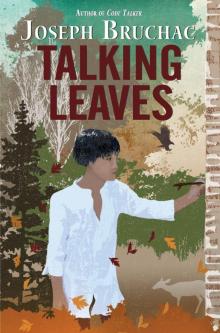 Talking Leaves
Talking Leaves Found
Found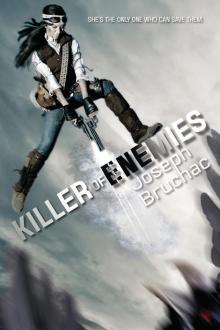 Killer of Enemies
Killer of Enemies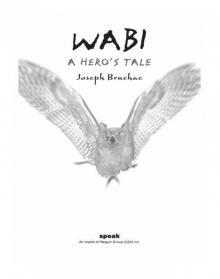 Wabi
Wabi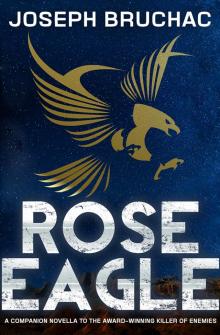 Rose Eagle
Rose Eagle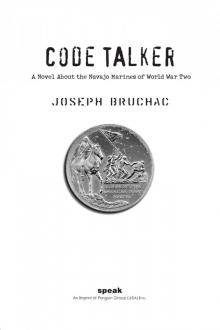 Code Talker
Code Talker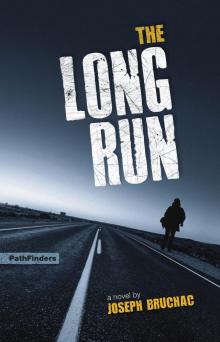 The Long Run
The Long Run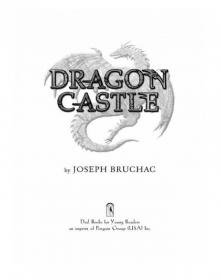 Dragon Castle
Dragon Castle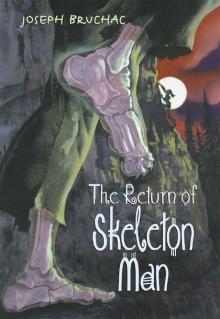 The Return of Skeleton Man
The Return of Skeleton Man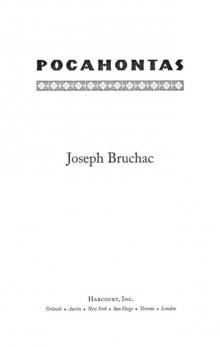 Pocahontas
Pocahontas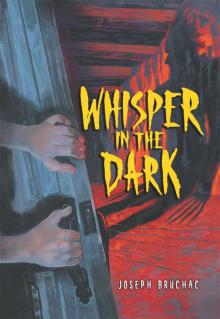 Whisper in the Dark
Whisper in the Dark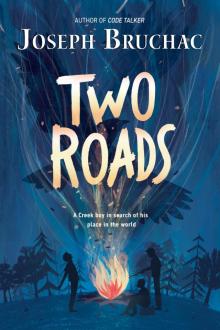 Two Roads
Two Roads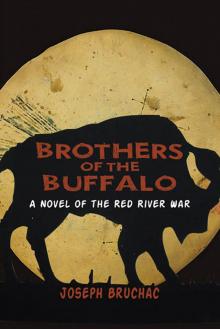 Brothers of the Buffalo
Brothers of the Buffalo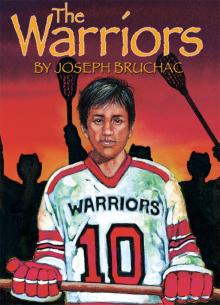 The Warriors
The Warriors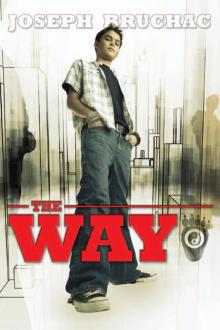 The Way
The Way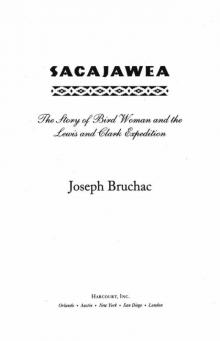 Sacajawea
Sacajawea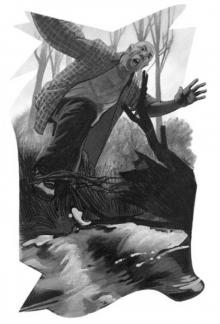 Night Wings
Night Wings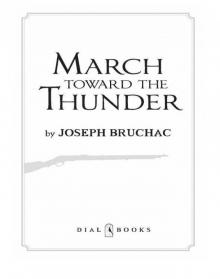 March Toward the Thunder
March Toward the Thunder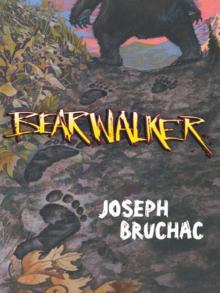 Bearwalker
Bearwalker Skeleton Man
Skeleton Man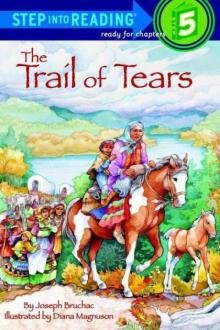 The Trail of Tears
The Trail of Tears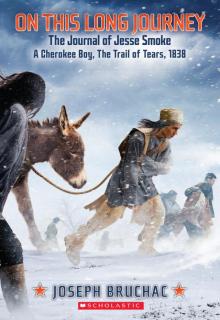 On This Long Journey
On This Long Journey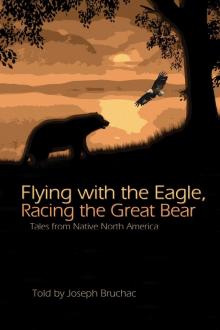 Flying with the Eagle, Racing the Great Bear
Flying with the Eagle, Racing the Great Bear